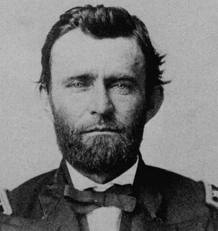 Bummer has always believed that any exceptional leader is only as awesome as the subordinates that surround him. Ulysses S. Grant was undoubtedly one of the greatest generals in history. Grant had many innate abilities, but his most dynamic was that he was willing to do what others would never dream of attempting. He could pull the trigger, when others wouldn’t or couldn’t.
Bummer has always believed that any exceptional leader is only as awesome as the subordinates that surround him. Ulysses S. Grant was undoubtedly one of the greatest generals in history. Grant had many innate abilities, but his most dynamic was that he was willing to do what others would never dream of attempting. He could pull the trigger, when others wouldn’t or couldn’t.
After hearing rumors of the General’s inebriation, Secretary of War Stanton sent Charles A. Dana on a special mission to be the eyes and ears of the administration with Grant’s Army on the Mississippi River. Dana telegraphed Washington,”Grant is an uncommon fellow, the most modest, the most disinterested, and the most honest man I ever knew, with a temper that nothing could disturb, and a judgement that was judicial in its comprehensiveness and wisdom. Not a great man, except morally, not an original or brilliant man, but sincere, thoughtful, deep, and gifted with courage that never faltered. Unaffected, unpretending hero, who no ill omens could deject and no triumph unduly exalt.”
General Grant had an exceptional staff of supporting officers, including his right hand, John A. Rawlins, a commissioned Captain and Assistant Adjutant General. Rawlins joined Grant in Galena, Illinois and continued to serve the General for eight years and eventually was appointed President Grant’s Secretary of War.
Rawlins had heard the tales of Grant’s drunkenness while in Army service after the Mexican War. He firmly informed Grant, that the first time he saw the general drunk would be the last day he would be his aide. All visitors and correspondence filtered through Rawlins and he often edited Grant’s written directives. The General rarely traveled anywhere without his Adjutant watching and monitoring his every mood and companionship.
Rumors continued to abound of Grant’s battle with the bottle. Men of high military rank and political status envied the General’s rapid ascent in public standing and were always looking for the opportunity to impune his leadership and reputation. Grant suffered from acute migraine headaches and symtoms of this malady can assume the aspects of a drunken stupor or droziness.
Bummer feels that Rawlins was a major contributor towards framing Grant’s image and legacy. He held the General in good stead, when the General might not have done so himself. John A. Rawlins died in 1869, just six months after Grant became President. This administration might have been more successful if Rawlins had been at Grant’s right hand. After Ulysses S. Grant’s death a sealed letter from Rawlins was opened and it read, “I find you where the wine bottle has been emptied, in company with those who drink, and urge you not to do likewise.”Rawlins noted that this advice was “heeded, and all went well.”
Bummer


One of those staff officers like Walter Bedell Smith for Eisenhower who are instrumental to a great commander’s success. Enjoyed this post.
You’re so right regarding Smith for Eisenhower. I have gotten the impression that Rawlins was almost a body guard,an angel that Grant had on his shoulder,whispering in his ear. Not much to substantiate this, however it’s a shame that he died so early on, Grant really could have used his friendship and advise as President.
Bummer
I just thought of another staff officer who performed a similar role: Ike himself for MacArthur. Apparently liking your boss is not essential to being an effective staff officer.
Bummer believes that Ike didn’t have much of choice in the staff officer position. The Army had few plumb posts at the time and even a staff position with MacArthur was better than a sharp stick in the eye. Louis, thanks for the input.
Bummer